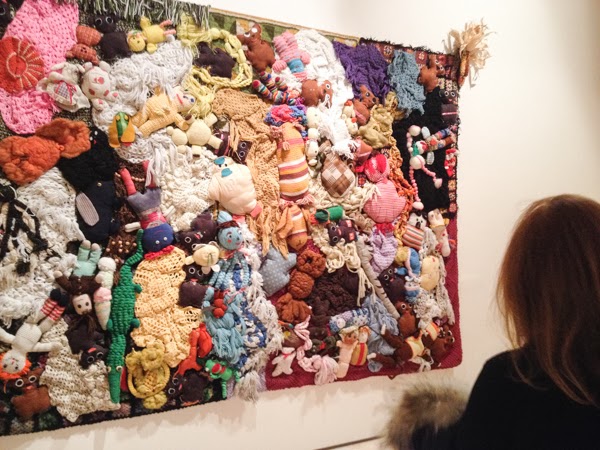I found several things interesting. The first piece catching my attention was perhaps one of his earliest pieces in the show. My Institution Meets Your Institution attempted to demonstrate the need to break down the barrier between high and low culture by incorporating drawing found at a museum's loading dock with signifiers of high culture. I found the red ribbon engaging as it lead to a battering ram that could supposedly be used to break down the down leading to the loading dock.
I previously knew of Mike Kelley's work involving stuffed animals, but these interested me much more seeing them in person. I participated in a guided tour after scoping out the work myself. It wasn't very enlightening, but the guide did elaborate on the piece, More Love Hours Than Can Ever Be Repaid. The guide said Kelley focused on the hours it took for each stuffed animal and afghan took to be made, and how the stuffed animals represented the love the maker felt towards the recipient, as well as the love the maker perhaps expected in return. When Kelley first displayed the work, however, many people felt it reflected a dramatic childhood event and that critique initiated a series of work on suppressed memory. It's quite fascinating to consider making a body of work based on the idea you forgot something.
His roll as a "youthful rebel" however, seems contrived. Sometimes, the work felt as though he tried too hard. He critiqued the system, perhaps, but he played by all their rules. When people suggested he had repressed childhood trauma, he made art about repressed childhood trauma. Even his piece, My Institution Meets Your Institution is meant to "break down the barrier" between high and low art, it still sits very much from the place of "high art" in terms of scale and presentation. The battering ram is nothing more than a prop, a symbolic gesture that fails to actually change the status quo. During the guided portion of my visit, the guide said Kelley longed for the "hippie" culture he missed out on, and I can see that evidenced in punk culture in general.
His latest work, the Kandor series, was much less appealing to me personally. I can appreciate the idea of protecting a home world, and the idea of never being able to return to where you grew up. The work felt too polished though. It felt more like misplaced movie set pieces, and I missed the visceral energy I felt in his earlier work, in particular the work with the stuffed animals. The part of the Kandor series I did enjoy were the cities that looked as if there were made of old bottles (as shown in the right image below). This more reflects on my personal aesthetic however, and my attraction to found objects as art.
The most inspiring part of the show for me was Educational Complex, and the large suspended stuffed animal balls. The idea of suspension creates a great visual and literal tension. It works well in Kelley's comic-like style, and I wonder about incorporating a similar technique in my own art. In Education Complex, it intrigued me to learn the original installation allowed for visitors to lie under neath the display and look up into. This seems like a very interesting way to view art. During our last residency, Angela Dufrane spoke of negative joy, and I can feel that same sentiment throughout Kelley's work. I left the show with the impression of a deep, underlying sadness. Overall, the show included a vast range of work and versatility amounting in an impressive showcase.











I've often felt this seemingly contradictory nature of Kelley's work. Perhaps its worth thinking that what Kelley is involving himself in is an ideology critique. Peter Burger in his book "Theory of the Avant-Garde" offers an example of Marx, "denounces as false consciousness an intellectual construct to which he yet does not deny truth" Marx is denouncing "God who is no more than an objectification of human qualities" but does not condemn the ideals that are set forth.
ReplyDeleteI also think that to form a critique against something (in this case class and gender come to mind maybe art I'm not sure) one must speak in that language. Again from "Theory of the Avant-Garde" (can you tell I'm reading this right now?) in the forward Schulte-Sasse say this, "any category that is meant to comprehend an object must be formulated on the basis of a concept of the developments of the object."
To try too hard is a sign of dedication and the real deal. In keeping with "youthful rebel" spirit check out live Led Zeppelin on youtube. Jimmy Page, one of rock in rolls best went for those solos so freaking hard every time that half of them terrible, but he rocked and he is loved.
Thanks for the comment Joshua, it was insightful. I wasn't very familiar with Kelley's work previous to this and I'm still trying to wrap my head around it. I like your parallel to Jimmy Page--very valid point! The book sounds interesting too.
ReplyDelete